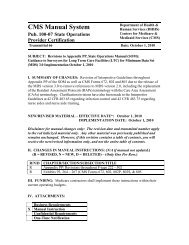LOUISIANA Community Mental Health Services Block Grant ...
LOUISIANA Community Mental Health Services Block Grant ...
LOUISIANA Community Mental Health Services Block Grant ...
You also want an ePaper? Increase the reach of your titles
YUMPU automatically turns print PDFs into web optimized ePapers that Google loves.
Regions/LGEs are now constructing their array of specialty recovery services to support individuals<br />
who are being discharged from the intermediate care hospitals and to provide enhanced services in<br />
the community that will avoid unnecessary hospitalizations. This effort to redesign and realign<br />
community services is being implemented in concert with a parallel initiative to provide opportunities<br />
to increase the numbers of individuals who can be discharged from intermediate care facilities and<br />
reduce the number of beds in these hospitals. This is part of the current OBH initiative to shift the<br />
focus of treatment from expensive inpatient treatment to more cost-effective outpatient treatment.<br />
Implementation of the Office of Behavioral <strong>Health</strong><br />
The 2009 legislative session created the statutory authority to combine the Office of <strong>Mental</strong> <strong>Health</strong><br />
(OMH) and Office for Addictive Disorders (OAD) into the Office of Behavioral <strong>Health</strong> (OBH). The<br />
process for implementation has been ongoing since that time and involved the development of a statewide<br />
advisory committee, the OBH Implementation Advisory Committee, composed of stakeholders<br />
at all levels. This advisory committee formed 5 workgroups to address the necessary issues to be<br />
considered when combining two state agencies. These workgroups formulated recommendations to<br />
the overall advisory committee which in turn issued a final report with summarized recommendations<br />
to the DHH Secretary at the beginning of this year. The Secretary made a report to the legislature<br />
prior to the start of the 2010 legislative session. The report was accepted and the legislature approved<br />
the implementation of OBH as of July 1, 2010. As part of this process, a new Assistant Secretary for<br />
OBH has been appointed and the Central Office administration is currently undergoing<br />
reorganization to address the mission of the new agency. The process of implementation has been<br />
made easier as a result of the state‟s experience being in the first recipient cohort of the SAMHSA<br />
funded Co-occurring State Infrastructure <strong>Grant</strong> (COSIG) program. The state completed its<br />
participation in 2008 and since that time has used what was developed during the grant period to<br />
maintain a focus on integration of mental health and substance abuse services and building capacity<br />
within clinics and by the workforce to address the needs of those individuals who have co-occurring<br />
disorders and present to our clinics for treatment. OBH staff experts who directed the grant project<br />
and formed the state-level evaluation team continue to share their expertise with other states that are<br />
current COSIG grantees during monthly multi-state conference calls and through TA to those states<br />
on the use of a fidelity tool that measures a program‟s capability to provide co-occurring treatment.<br />
Recently, two OBH staff members were invited to attend the 6 th Annual COSIG <strong>Grant</strong>ee Meeting in<br />
Bethesda, MD to present their data on the results achieved by Louisiana in enhancing capability for<br />
treating co-occurring disorders.<br />
Louisiana Spirit Coastal Recovery Counseling Program<br />
After the Deep Water Horizon/British Petroleum Oil Spill off the Louisiana coastline on April 20,<br />
2010, the State of Louisiana anticipated that the slowly unfolding disaster would have mental,<br />
emotional and behavioral health tolls on the lives of residents‟ who had been impacted. The State<br />
decided initially to utilize 1.1 million of the 25 million dollars given to each coastal state through the<br />
Oil Spill Liability Trust Fund to provide crisis counseling services to those impacted. The decision<br />
was made to utilize a program design similar to what had been funded by the Robert T. Stafford<br />
Disaster Relief and Emergency Assistance Act. The Louisiana Spirit Coastal Recovery Counseling<br />
Program design was modeled after the successful Louisiana Spirit Hurricane Recovery Program<br />
which is further described in Criterion One of this document. Underscoring the seriousness of this<br />
disaster, DHH Secretary Alan Levine wrote to DHHS Secretary Kathleen Sebelius:<br />
“Studies conducted after the Exxon Valdez spill definitively showed the long-lasting<br />
psychological impact of this kind of technological disaster, particularly on those who rely on<br />
PART C <strong>LOUISIANA</strong> FY 2011 PAGE 88<br />
SECTION II: ADULT & CHILD/ YOUTH<br />
IDENTIFICATION & ANALYSIS OF SERVICE SYSTEM’S STRENGTHS, NEEDS, & PRIORITIES<br />
RECENT SIGNIFICANT ACHIEVEMENTS
















